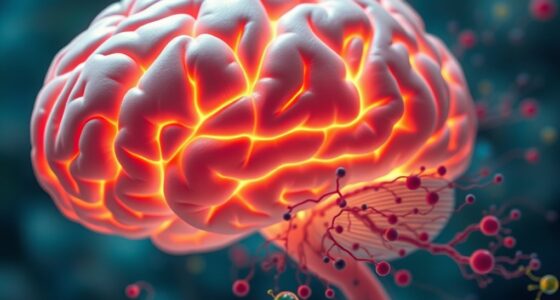If you're feeling mentally weak, the shocking reason you can't focus might be due to underlying mental health issues. Anxiety and depression greatly impair your concentration, making tasks feel overwhelming. Sleep disturbances can drain your energy, while cluttered environments hinder your ability to think clearly. You might not realize that even a lack of certain nutrients can affect cognitive function. It's crucial to recognize these symptoms early and seek help if they persist. Focusing on practical strategies for improvement can make a big difference, and uncovering more details can help you regain control and clarity in your life.
Key Takeaways
- Cognitive impairment may stem from memory lapses, affecting your ability to concentrate on tasks effectively.
- Environmental distractions, such as clutter and noise, significantly hinder focus and productivity.
- Mental health issues, like anxiety and depression, can severely impact your concentration and cognitive clarity.
- Nutritional deficiencies in essential vitamins and omega-3 fatty acids may contribute to decreased mental function and focus challenges.
- Sleep disturbances can exacerbate concentration problems, leading to a cycle of fatigue and mental weakness.
Symptoms of Inability to Focus

Often, you might notice symptoms that point to an inability to focus, which can considerably affect your daily life. These symptoms often manifest as memory lapses, especially for recent events, signaling potential cognitive impairment. You may find yourself frequently misplacing items, a clear sign of attention and concentration issues. Additionally, regular use of adaptogenic herbs can support energy levels and help combat fatigue, which may enhance your ability to focus.
Incorporating a growth mindset can also foster resilience and improve your ability to concentrate on tasks at hand. If you're struggling with persistent difficulty sleeping, this can worsen your concentration challenges, leaving you feeling fatigued and mentally drained. Additionally, incorporating mushroom coffee into your routine may help enhance cognitive function and focus, potentially alleviating some of these issues. Furthermore, maintaining hydration support is crucial, as dehydration can also impact your cognitive abilities. You may also experience noticeable declines in your work or academic performance, which can be frustrating and demoralizing.
Additionally, you might find challenges in clear thinking and decision-making, both indicative of underlying concentration difficulties. These symptoms can create a vicious cycle: the more you struggle to focus, the more it impacts your mental health. Recognizing these signs is essential, as they can help you understand the severity of your situation. Addressing these issues early on can lead to better strategies for improvement and reclaiming your mental clarity.
Moreover, implementing AI analytics can help you track your cognitive performance over time, providing insights that may assist in regaining your focus. Don't ignore these symptoms—acknowledging them is the first step toward regaining control over your focus and overall well-being.
Common Causes of Distraction

Distractions can arise from various common sources that greatly impact your ability to concentrate. Environmental factors, like cluttered workspaces and excessive noise, can create a chaotic atmosphere that hinders productivity. Additionally, mental health issues such as anxiety affect around 31.1% of adults, leading to persistent distraction and impaired cognitive function. Sleep disturbances, affecting 50-70 million Americans, exacerbate these concentration problems, making you more susceptible to distractions throughout the day. It's important to remember that sleep can also be a tool for aligning with desired realities, enhancing your focus and mental clarity. You might also find that multitasking, while tempting, actually reduces efficiency and increases errors by up to 40%. This constant juggling can leave you feeling overwhelmed and unable to focus on one task effectively. Furthermore, nutritional deficiencies, particularly in vitamins and omega-3 fatty acids, have been linked to decreased cognitive function. Regular consumption of herbal teas may also aid in alleviating anxiety and improving focus. If your diet lacks these essential nutrients, you could experience heightened difficulties in maintaining focus. Engaging in regular physical activities, such as tummy time, can also play a crucial role in enhancing overall cognitive development. Research suggests that incorporating beetroot into your diet can support brain health as well. Recognizing these common causes of distraction is the first step toward improving your concentration and addressing the underlying issues that may be holding you back from achieving your full potential. Additionally, developing a structured routine can significantly enhance your ability to focus and reduce distractions in your daily life, as it promotes stability and consistency structured routine.
Mental Health Conditions Impacting Focus

Mental health conditions greatly impact your ability to focus, with research showing that nearly 50% of individuals with depression experience cognitive difficulties. These cognitive impairments can manifest in various ways, affecting your daily life. Additionally, understanding the importance of open communication about feelings can be beneficial in managing emotional distress. Regular check-ups with a professional can also help identify hidden risks that may be contributing to your mental health struggles. In particular, narcissistic tendencies can exacerbate emotional distress and hinder focus in relationships. Understanding the dynamics of astrological compatibility can also offer insights into personal appeal and relationship stressors that may affect mental clarity.
| Mental Health Condition | Impact on Focus |
|---|---|
| Depression | 50% experience difficulty concentrating |
| Anxiety Disorders | Affects 31.1% of adults; leads to restlessness and trouble focusing |
| Adult ADHD | Often undiagnosed; causes task completion issues and hyper-focusing on irrelevant details |
You might find that emotional shock and PTSD from extreme life changes disrupt your cognitive processes, making it hard to think clearly. It's also important to note that anxiety disorders frequently co-occur with depression, with about 25% of those affected facing additional cognitive challenges. Furthermore, understanding the connection between Parkinson's and dementia may shed light on how cognitive decline can influence focus in individuals dealing with these conditions.
If you struggle with difficulty concentrating, understanding how these mental health conditions intertwine could help you identify the root cause of your focus issues. By recognizing these connections, you can take the first step towards addressing your concentration problems.
Coping Strategies for Better Concentration

To regain your ability to concentrate, it's essential to adopt effective coping strategies that cater to your unique needs. Here are three strategies to enhance your focus and mental clarity:
- Create a Distraction-Free Workspace: Organize your environment to minimize distractions. A clean, quiet space can help you maintain concentration on your tasks without interruptions. Incorporating essential oils through aromatherapy can enhance your workspace ambiance and promote relaxation, as certain oils like peppermint oil may invigorate your senses and stimulate mental clarity. Using essential oils such as lavender in your workspace can also reduce stress and elevate your mood. Additionally, studies suggest that curcumin's anti-inflammatory properties can help mitigate cognitive decline, further boosting your focus.
- Incorporate Exercise and Nutrition: Regular physical exercise boosts cognitive function and reduces anxiety. Pair this with a balanced diet, rich in omega-3 fatty acids and antioxidants, to support brain health and improve focus.
- Practice Mindfulness Techniques: Engage in mindfulness practices like meditation or deep breathing. These techniques can notably lower anxiety levels and foster a calm mental state, allowing you to concentrate better.
Additionally, fostering emotional alignment can significantly enhance your mental clarity and focus, helping you tackle tasks more effectively.
Implementing these strategies can enhance your concentration, enabling you to tackle tasks more effectively.
Academic and Work Performance Challenges

Struggles with focus can greatly impact your academic and work performance, leading to frustration and decreased self-esteem. High intelligence doesn't guarantee success; many bright individuals face concentration challenges during exams. This often results in anxiety disorders that hinder cognitive function, affecting your grades and overall mental health. Additionally, narcissistic relationships can create emotional turmoil that further distracts from your ability to concentrate. To compound these issues, physical discomfort or pain can also lead to agitation and difficulty focusing, especially in those experiencing cognitive decline. Understanding the importance of effective communication techniques can also play a role in minimizing misunderstandings that contribute to focus issues. Furthermore, environmental interactions can significantly influence concentration levels and overall mental well-being.
In the workplace, the decline in mental health can lead to increased errors and lower productivity. Approximately 50% of individuals with depression also experience anxiety, which can severely impair your ability to focus on tasks. If you have ADHD, you're not alone—around 9.4% of children are affected, and symptoms can persist into adulthood, complicating both academic and work performance.
Here's a quick look at how these factors interplay:
| Factor | Impact on Performance |
|---|---|
| Academic Performance | Poor grades due to lack of focus |
| Work Performance | Increased errors and decreased productivity |
Understanding these challenges is vital. Seeking treatment options, such as therapy or medication, can help you regain control over your concentration and improve your overall performance in both academic and professional settings. Additionally, utilizing professional training for public speaking can enhance your communication skills and confidence, which may indirectly improve your focus and performance.
Emotional Factors Affecting Focus

Emotional factors can weigh you down, making it tough to concentrate and stay focused. When you're dealing with emotional distress, your mental resources are stretched thin. Anxiety and depression can cloud your thoughts, leading to cognitive difficulties.
Here are three key emotional factors that impact your focus:
- Anxiety: This can consume your mental energy, leaving you unable to concentrate on tasks.
- Depression: Often co-occurring with anxiety, it can create fuzzy thinking and racing thoughts that severely hinder your ability to focus.
- PTSD: Childhood trauma may lead to persistent anxiety symptoms, making daily functioning a struggle.
Negative thought patterns associated with emotional distress can also manifest as low self-esteem, further complicating your mental health.
Cultural and familial expectations might create additional pressure, leading you to feel isolated and depressed. These feelings can cloud your cognitive clarity, making it nearly impossible to concentrate on what truly matters.
If you find yourself stuck in this cycle, recognizing these emotional factors is the first step toward regaining your focus. Start addressing these issues, and you'll notice improvements in your concentration and overall mental well-being.
External Influences on Concentration

When it comes to concentration, external influences play a huge role in your ability to focus.
Cultural expectations and lifestyle choices can create pressure that distracts you, while environmental stressors add another layer of challenge.
Recognizing these factors is essential for improving your mental clarity and productivity.
Cultural Expectations and Pressure
Cultural expectations often weigh heavily on individuals, creating a relentless pressure to excel in various aspects of life. This pressure can lead to increased anxiety, affecting your concentration and mental clarity. You might find yourself struggling to focus on tasks due to emotional distress caused by societal norms and family dynamics.
Consider these three sources of pressure you might face:
- Familial Expectations: In collectivist cultures, the burden to meet family standards can intensify stress, making it harder to concentrate on your personal goals.
- Societal Norms: The desire to conform to cultural ideals can evoke feelings of inadequacy, which contribute to mental fatigue and diminish your ability to focus.
- Stigmas Surrounding Mental Health: Cultural taboos can prevent you from seeking help, leaving unresolved stress that further impairs your cognitive function.
Recognizing the impact of these cultural expectations on your mental health is essential. By acknowledging these external influences, you can take steps to manage the pressure and improve your concentration, ultimately leading to a healthier mindset.
Lifestyle Choices and Impact
Lifestyle choices greatly impact your ability to concentrate and maintain mental clarity. Poor nutrition, lack of sleep, and chronic stress can lead to cognitive impairments, making it harder to focus on tasks. For instance, sleep deprivation can considerably reduce your attention span, while chronic stress activates instincts that hinder your concentration. Additionally, multitasking, which many believe improves productivity, often leads to mistakes and diminished focus.
Adopting healthier lifestyle choices can enhance your cognitive function and improve your concentration. Regular physical exercise not only reduces stress but also enhances mental sharpness. Here's a quick overview of how different lifestyle choices affect your concentration:
| Lifestyle Choice | Impact on Concentration | Benefits |
|---|---|---|
| Poor Diet | Increases cognitive impairments | Better focus with balanced nutrition |
| Sleep Deprivation | Reduces attention span | Improved mental clarity with adequate sleep |
| Chronic Stress | Hinders attention | Enhanced focus through stress management |
| Regular Physical Exercise | Boosts cognitive function | Increased mental sharpness and concentration |
Environmental Stressors and Distractions
Environmental stressors can easily derail your concentration, making it tough to focus on tasks. These distractions overwhelm your brain, leading to cognitive impairments that hinder your mental clarity.
To illustrate, consider these common environmental stressors in your workspace:
- Noise: Background sounds can fragment your attention, pulling you away from deep focus.
- Clutter: A disorganized environment can reduce your productivity by 25%, as it distracts your mind and makes it harder to concentrate.
- Interruptions: Frequent disruptions from others can lead to multitasking, which studies show can decrease your productivity by up to 40%.
When you're trying to juggle multiple tasks due to external pressures, your efficiency plummets. Stressful environments activate your brain's survival instincts, making it a challenge to maintain focus.
If you find yourself struggling with concentration, take a moment to evaluate your workspace. Creating a calm, organized environment can greatly enhance your ability to focus and boost your overall productivity.
Prioritize mental clarity by addressing these environmental stressors, and watch your ability to concentrate improve dramatically.
Seeking Professional Help

When you're grappling with persistent focus issues, it's important to reach out for professional help. Concentration difficulties that disrupt your daily life can be a key indicator of an underlying mental health condition.
If you're experiencing ongoing sadness, hopelessness, or guilt alongside these challenges, it's imperative to seek evaluation from a mental health professional.
Changes in your sleep patterns, such as insomnia or sleeping too much, can greatly affect your focus and cognitive function. These shifts may signal the need for professional intervention.
Chronic anxiety or worry that consistently interferes with your daily activities often suggests a more serious issue that warrants consultation.
Additionally, if you notice physical symptoms like unexplained weight loss, fatigue, or other health concerns, it's crucial to have these assessed by a healthcare provider.
These underlying issues can profoundly impact your ability to concentrate and function effectively. By seeking professional help, you can address these challenges head-on, paving the way for improved focus and overall well-being.
Don't hesitate to take the first step towards a healthier mindset and better quality of life.
Frequently Asked Questions
What Mental Illness Causes Inability to Focus?
Several mental illnesses can cause an inability to focus.
For instance, depression often brings fuzzy thinking and racing thoughts, making concentration tough.
Generalized Anxiety Disorder can lead to persistent worry, which distracts you from tasks.
PTSD can disrupt your cognitive clarity, affecting your focus.
ADHD may result in ongoing trouble with attention and task completion.
Even conditions like chronic fatigue syndrome can lead to brain fog, further hindering your ability to concentrate effectively.
Why Am I so Unable to Focus When I Feel Overwhelmed?
Why's it so hard to focus when you're overwhelmed? When stress hits, your brain's survival instincts kick in, making it tough to concentrate.
Chronic anxiety can drain your mental energy, leaving you feeling scattered. Add sleep deprivation, poor nutrition, or multitasking, and it's no wonder you struggle.
Emotional shocks can cloud your mind even further. Taking a step back to breathe and simplify your tasks can help restore your focus and clarity.
Why Do I Feel Out of It and Can't Focus?
You might feel out of it and struggle to focus due to brain fog, which often stems from stress, anxiety, or lack of sleep.
Nutritional deficiencies can also play a role, particularly if you're missing essential vitamins or omega-3s.
Hormonal imbalances may contribute to these feelings, too.
Take a moment to assess your lifestyle; improving your diet, ensuring quality sleep, and managing stress could help clear your mind and boost your concentration.
What Is the Main Cause of Lack of Concentration?
They say, "A cluttered mind leads to a cluttered life."
The main cause of your lack of concentration often lies in various factors. Mental health issues like anxiety and depression can cloud your focus. Medications may also play a role, impairing your cognitive abilities.
Nutritional deficiencies, environmental distractions, and chronic sleep disorders further hinder your ability to concentrate effectively. Identifying and addressing these aspects can help you regain your focus and clarity.
Conclusion
When you're struggling to focus, it's easy to feel overwhelmed, but remember, you're not alone in this journey. Sometimes, life's little distractions can cloud your mind, making it tough to concentrate. By embracing coping strategies and acknowledging emotional influences, you can gently guide yourself back to clarity. If the fog persists, seeking a guiding hand from a professional can illuminate the path forward. You have the strength to regain your focus and thrive once more.










